
While your baskets are filling with your long-awaited tomatoes, zucchini and peppers, you might not be thinking about the months to come. But the garden season doesn't have to end when the weather cools off. Midsummer is the perfect time to start plants for a second harvest. Here are five vegetables you can plant right now and enjoy in a couple of months. Happy harvesting!
SWEET BASIL
Ocimum basilicum
By midsummer, basil is usually sending up flowers and setting seed, causing the flavor to decline. Although basil isn’t a cool-season crop, now is the perfect time to plant another round so you can keep the harvest going until temperatures regularly drop below 50 degrees F, when plants start to decline.
WHEN TO PLANT If you start seeds, sow them 60 to 90 days before you want to harvest, depending on the variety. If you can keep the seed bed moist, sow directly in the garden. If not, start indoors and move transplants outdoors later. Even easier, just pick up a few packs of seedlings from the garden center and plant them in the garden in summer so you can keep harvesting into fall.
WHAT TO CHOOSE Lemon basil (O. basilicum var. citriodorum) and ‘Purple Ruffles’ (Ocimum basilicum var. purpurascens) are two of the best cool-weather performers and can handle temperatures below 50 degrees F.
GROWING TIPS Plant in a warm, sunny spot and apply a 2-inch layer of mulch to the base of the plant to help keep soil and roots warm when air temperatures begin to drop. Or grow basil in pots and bring plants indoors to keep them going longer.
BUSH BEANS
This story is from the Issue 172 - August 2023 edition of Garden Gate.
Start your 7-day Magzter GOLD free trial to access thousands of curated premium stories, and 9,000+ magazines and newspapers.
Already a subscriber ? Sign In
This story is from the Issue 172 - August 2023 edition of Garden Gate.
Start your 7-day Magzter GOLD free trial to access thousands of curated premium stories, and 9,000+ magazines and newspapers.
Already a subscriber? Sign In

Spinach - Learn the secrets to growing this tasty green in spring and fall.
If you're one of those gardeners who can't wait to get started in spring and hates to throw in the trowel in fall, spinach is the perfect shoulder season crop. This mild, earthy-flavored green comes in many varieties, ranging from crinkly-leafed savoys to slightly textured semi-savoys and the flat, smooth-leafed types. Colors can be dark green, light green and even red-veined. Here's how to get the most of it every year.
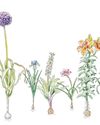
Why Bulb Depth Matters - Dig deep enough to ensure your plants stand tall and live the longest
When you're planting bulbs, it's tempting to just dig a hole as deep as your trowel will reach easily, nestle the bulb in, cover it up and move on. But the fact is, each type of bulb will flower best and thrive at a different depth.A good rule of thumb is to plant a bulb two to three times its height. One reason planting depth is important is because it helps to keep the bulbs protected from fluctuations in temperature that happen closer to the surface.
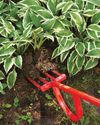
GARDEN ESSENTIALS
FALL GARDEN CLEANUP TOOLS
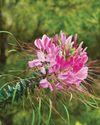
Saving Seeds
Saving flower seeds is a great way to get more plants with almost no investment. It's easy to do. Here's how to save seeds from some of your favorite annuals as the growing season winds down.

Cucumber Trellis Flop
I watched cucumber trellis growers online for several seasons with envy. What a brilliant way to save space in raised garden beds and make it look fancy! Finally, I was sold and decided to try it in my garden.

9 Tough Perennials for Clay Soil
Whether you garden in the nutrient-poor red clay of the Southeast, the calcium combined-with-clay caliche of the West or something in between, the common denominator is that clay soil is difficult to grow in. Why? Tiny particles of clay hold tightly together, slowing drainage and limiting the amount of oxygen that can reach plant roots. You've seen the resultsanemic-looking or rotting plants.

Garden Fences
Discover the perfect blend of functionality, style, and materials for your ideal fence.

A GARDEN OF STORIES
Learn plant and project tips from a couple who's been gardening here for nearly 50 years.
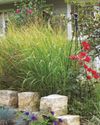
Switchgrass
Adaptable switchgrass goes with the flow.
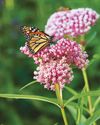
Establish a Monarch Waystation
Did you know that a single monarch butterfly can migrate up to 3,000 miles? That's a lot of ground to cover! This amazing insect makes a fascinating journey, unlike any other butterfly.